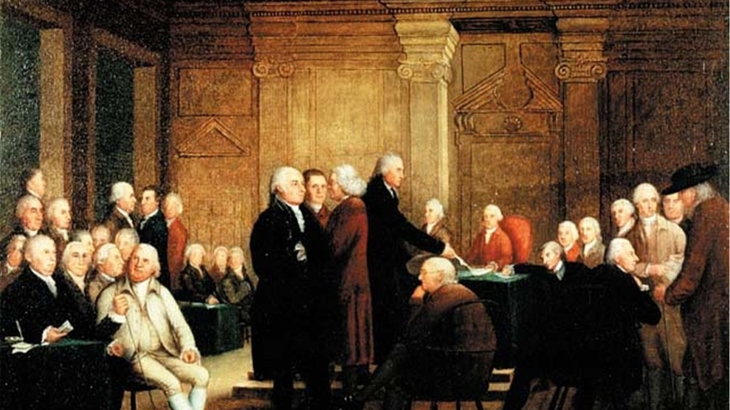Principle of America’s National Sovereignty
 Essay Read By Constituting America Founder Actress Janine Turner
Essay Read By Constituting America Founder Actress Janine Turner
“That these are our grievances which we have thus laid before his majesty, with that freedom of language and sentiment which becomes a free people claiming their rights, as derived from the laws of nature, and not as the gift of their chief magistrate: Let those flatter who fear; it is not an American art. To give praise which is not due might be well from the venal, but would ill beseem those who are asserting the rights of human nature. They know, and will therefore say, that kings are the servants, not the proprietors of the people.” – Thomas Jefferson in his pamphlet, “A Summary View of the Rights of British America” July 1774, Williamsburg, Virginia.
This essay by Thomas Jefferson, written two years before Congress would declare American independence, contains many of the same arguments that would eventually justify the separation of Great Britain in 1776. Here Jefferson speaks of the natural rights of “a free people,” and calls the King a “servant” rather than the “proprietor” (or owner) of the people. As essay #9 of this study showed, Americans had been developing the idea that those who govern must do so for the good of the people, rather than use their subjects for their own good, and Jefferson’s argument in “A Summary View” echoes that sentiment.
It is also important to note that the quote from Thomas Jefferson’s “Summary View of the Rights of British America” reveals that the American Revolution involved more than the legal separation of the United States from Great Britain. It was at its core an ideological movement that was motivated by a political philosophy shared in common not only by the prominent movers of events but by Americans in general. This philosophy, commonly referred to as social compact theory, led to and supported the principles contained in the Declaration of Independence, which in turn expressed the principles upon which American national sovereignty and independence are justified.
The Declaration of Independence begins and ends with statements regarding the right of a people to establish and maintain their national sovereignty. The Declaration asserts that “one people” are entitled to assume a “separate” station from all others, and they derive this right – a right that is shared equally by all peoples – from “the Laws of Nature and of Nature’s God.” It begins with the claim that the “laws of Nature and Nature’s God” entitle “one people,” when necessary, to “dissolve the political bands which have connected them with another,” and “to assume among the powers of the earth” a “separate and equal station.” It ends with the claim that as “free and independent” states, the United States have dissolved “all political connection between them and the State of Great Britain,” and therefore “have full power to levy war, conclude peace, contract alliances, establish commerce, and to do all other acts and things which Independent States may of right do.”
The opening and closing paragraphs of the Declaration of Independence, therefore, have this principle in common – for a people or nation to be “free and independent,” it must totally dissolve “all political connection between them” and other nations. The immediate purpose of the Declaration of Independence was to formalize our separation from Great Britain; but it also expressed a fundamental principle – to be truly free and independent (i.e., sovereign over its own affairs) the United States ought to have no political connection with any other nation.
Like individual liberty, national independence is necessary to allow one people, through their government, to decide for themselves how best to secure and exercise their individual liberty. The first paragraph of the Declaration of Independence therefore transposed the principle of individual liberty to apply to whole peoples and nations. Nations are described as having the right, by the “Laws of Nature and of Nature’s God,” to an equal station as “free and independent” states. And individuals are described as having the equal unalienable or natural right to liberty. The Declaration of Independence teaches us, therefore, that there is an inseparable connection between individual liberty and political independence – or what one might call “national liberty” – and it establishes this fundamental relationship in its very first paragraph.
 Christopher C. Burkett is Associate Professor of History and Political Science, and Director of the Ashbrook Scholar Program at Ashland University.
Christopher C. Burkett is Associate Professor of History and Political Science, and Director of the Ashbrook Scholar Program at Ashland University.
Click here for First Principles of the American Founding 90-Day Study Schedule.
Click here to receive our Daily 90-Day Study Essay emailed directly to your inbox.




Such a good explanation regarding the separation from GB and the reasons we fought for freedom. I am Declaration loving member of America having had an ancestor who was a Signer.